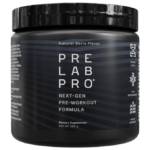Pre-workouts are designed to help keep you energized and focused throughout your fitness training session, and they are used by both major athletes and hobby-going gym lovers alike.
However, due to the stimulating effects they provide, which can interfere in your daily life, or perhaps because you need to know it will last as long as your workout, you may wonder, how long does a pre-workout last?
A pre-workout can last anywhere from 30 minutes to 2 hours after consuming it, depending on the ingredients as well as the individual and the effects they are looking for.
What is in Pre-Workouts/How Do They Work?
In general, pre-workouts contain a formulation of caffeine and amino acids.
Caffeine is a stimulant that has been shown to help boost energy and mental clarity; therefore, it is often added to pre-workouts to help those in training obtain a more focused workout for optimum results.
Meanwhile, amino acids, which typically include either one or a combination of the following: creatine, branched amino acids (BCAAs), beta-alanine, arginine, and more, are also often included for their muscle repair and muscle building effects, as well as their ability to help prevent delayed onset muscle soreness.
What Forms Do Pre-Workouts Come In?
Many pre-workouts are available in powder form, which enables them to be mixed with juice or water. However, they also come in bottled or canned drinks and capsules.
How Long Does it Take for Pre-Workouts to Kick In?
The combination of ingredients in a pre-workout ultimately determines how long it will take for it to kick in.
However, generally, it can take up to about an hour to feel the full effects of caffeine, and they can last up to 9 or more hours, depending on the individual’s tolerance.
On the other hand, amino acids take a bit longer to kick in. For instance, arginine, which is another popular ingredient added to pre-workouts, can take up to 90 minutes to work.
Hence, the combination of ingredients takes varying lengths of time to experience their impact.
But, since a boost of instant energy is what is needed to get you through your workout, it is recommended you take a pre-workout 30 minutes before exercise to allow the caffeine to get into your bloodstream and take effect, and then rest assured knowing the amino acids will kick in later as your muscles need them.
All in all, a pre-workout with all of its ingredients can last from 30 minutes to 2 hours.
However, you need to also take your body mass, activity level, the amount per serving, the number of servings you consume over a particular tie, and your sensitivity to the ingredients into consideration because they are what determine the overall effects.

Does a Pre-Workout Help You Lose Weight?
According to experts, pre-workouts don’t directly cause you to lose weight, but when they are taken as part of a healthy eating and fitness plan, they can provide you with the increased energy you need to power through your workout, which causes you to burn more calories and fat, thus leading to a gradual reduction in weight.
Furthermore, caffeine was shown to help suppress the hunger hormones and delay stomach emptying, which causes you to consume fewer calories than you burn, thus also aiding in weight loss.
Does a Pre-Workout Help You Build Muscle?
While pre-workouts also contain amino acids, such as BCAAs, that help build muscle mass and burn fat, they are mainly used to help prevent muscle glycogen depletion, which helps keep you supplied with enough energy to make it through your exercise routine.
Post workouts, on the other hand, typically contain a protein, such as whey isolate protein, and other ingredients that help with tissue growth; therefore, they are used more for muscle building.
Can I Take a Pre-Workout Everyday?
Many post workouts contain caffeine, which is safe for everyday use, provided you don’t exceed the daily recommended dose, which is 400 milligrams.
However, daily coffee or tea drinkers can easily exceed this limit by including a pre-workout along with other caffeinated drinks, which can make them unsafe for everyday use.
Caffeine is also a stimulant, so it can cause you to develop a dependence on it after prolonged use.
Therefore, it is strongly recommended that you periodically refrain from taking pre-workouts to help avoid becoming too reliant on them for an energy boost and motivation.
Furthermore, once you resume taking it, you will feel its effects stronger since your tolerance has decreased, which will enable you to enjoy more of its benefits each time you take a rest from taking it.
Amino acids are also considered fairly safe for everyday use, provided you consume them in the proper amounts.
Do Pre-Workouts Make You Crash Later?
Though caffeine provides you with lots of energy at first, it can make you crash later, which can cause you to feel sluggish, sleepy, and irritable.
However, this can be avoided by limiting your amount of caffeine throughout the day, which will prevent you from consuming too much, which can lead to adverse effects ranging from mild to severe.
What are the Side Effects of Pre-Workouts?
Depending on your sensitivity to caffeine, it can cause you to experience various side effects, such as anxiousness, low mood, headache, rapid heartbeat, increased blood pressure, and more.
When caffeine is taken too late in the day, it can also cause sleepiness at night. It is also a diuretic, so it can cause you to urinate frequently, which can cause dehydration.
Meanwhile, some amino acids, such as beta-alanine, can cause a tingly or itchy feeling in your body. However, it tends to go away after a few minutes.
And niacin, another ingredient often added to pre-workouts, can also cause skin flushing in some individuals.
What are the Long-Term Effects of Pre-Workouts?
Low to moderate use of caffeine each day doesn’t seem to have any long-term effects.
However, regular use of more than 600 milligrams of caffeine has been linked to chronic insomnia, depression, constant anxiety, stomach problems, high blood pressure, and more.

What is the Best Way to Take a Pre-Workout to Avoid Side Effects?
If you are a beginner to pre-workouts, experts recommend you start with a lower dose than the manufacturer’s recommended serving to see how your body tolerates it, and then slowly increase your intake to meet the full dose once you feel comfortable.
Likewise, you should also avoid taking more than the product’s suggested serving amount to avoid unwanted effects.
Pre-workouts should also be taken with at least 8 to 12 ounces of water; otherwise, it can cause them to be too strong, which can also cause side effects.
Furthermore, caffeine is stronger when you are low on sleep; therefore, it is also recommended you focus on getting a good night’s sleep to avoid a crash.
Are Pre-Workouts Bad for You?
Pre-workouts are not FDA approved; therefore, there are some risks associated with taking them because their ingredients are not regulated.
However, as a general rule to be safe, steer clear of products that contain controversial or banned ingredients, such as ephedra, DMMA, deterenol, etc., which can lead to a number of heart-related side effects, including increased blood pressure, heart rhythm problems, and heart attack.
Another issue with some post workouts is they contain excess caffeine, which can make them bad for you.
Therefore, be sure to only consume products that contain an appropriate amount of caffeine to help ensure they are not harmful to your health.
Third-party products tested also helps ensure their safety, so look for post workouts that are NSF International or USP stamped, etc., which means they are backed by a certified authority.
What if I Take Too Much Pre-Workout?
Ingesting too much caffeine has been associated with various side effects, including
insomnia, nausea, headaches, jitteriness, anxiety, increased heartbeat, and, in more severe cases, even cause a heart attack.
It can even cause brain fog or a loss of mental focus, which can make it hard to remain alert.
Therefore, it is advised that you take a slow approach to incorporate pre-workouts into your regimen for best results.
Can You Stop the Side Effects of Pre-Workouts?
Should you find that you have ingested too much caffeine or are just simply suffering from its side effects, the first thing you need to do is not consume any more caffeine.
Next, some experts suggest increasing your intake of water to help flush the caffeine out of your system. Some also suggest eating heavy foods, like bread or pasta, to help slow the process down.
You can also participate in light exercise to help your body metabolize the caffeine quicker. Meanwhile, performing a series of deep breathing exercises will help combat any anxiety or nervousness and help you remain focused.
Otherwise, you will simply have to wait it out, which can take up to a few hours or more for your body to get the caffeine out of your system.
However, if you are experiencing an inability to breathe, you have chest pains or fast heartbeats, you’re vomiting, you feel dizzy or faint, or you’re having hallucinations or uncontrollable convulsions, then you need to immediately seek medical help.
Who are Pre-Workouts Not For?
Pre-workouts are not recommended for everyone, including those with anxiety because it can worsen the condition. If you have pre-existing heart problems or seizure disorders, they can also trigger adverse reactions.
Caffeine can also worsen the symptoms of GERD (gastroesophageal reflux disease), so people with this issue should also avoid taking pre-workouts.
Pregnant women should also avoid taking pre-workouts because it is especially important to monitor their caffeine intake to avoid a low birth rate and other complications.
Lastly, if you are on prescription or over-the-counter medications, you should also avoid caffeine because it can hinder their efficacy.
However, whether you have a pre-existing health condition or not, it is always a good idea to check with your doctor before taking a pre-workout to ensure you are indeed a candidate.
Is a Pre-Workout Really Necessary?
It is possible to gain energy and muscle-building effects simply through the foods we eat; therefore, we do not necessarily need a pre-workout to energize us through exercise.
In fact, there are a wide variety of vegetables, fruits, and other nutritional foods that naturally provide us with energy, including oatmeal, whole wheat bread, beans, and other healthy carbs.
Meanwhile, protein-rich foods like chickpeas, chicken, fish, eggs, milk, and peas help build muscle.
And nuts, especially almonds, also contain muscle-building protein, and they also provide a boost of energy, help lower cholesterol and blood pressure. They are also low in calories.
The expert concludes, however, pre-workouts taken in moderation and in the right amounts are fine too.
There are also stimulant-free pre-workouts for muscle gains and more that you can use in the place of traditional products to help safely meet your fitness goals.
Our Recommended Pre-Workouts
| Legion Pulse Pre Workout Supplement | Pre Lab Pro® | NITROSURGE Pre- Workout Supplement |
 |
 |
 |
| The reason that Legion Pulse Pre Workout Supplement made our list is because | Pre Lab Pro® made it on our list because it’s one of the few pre-workouts that promotes homeostasis – it maintains that internal balance within your body that allows you to go all out with your training without affecting your function throughout the day. | We like NITROSURGE Pre- Workout Supplement simply because of the amount of different flavor options you have available to you. |
 |
 |
 |
Final Thoughts
So there you have it, a pre-workout added to your fitness routine helps increase your energy and focus for improved results.
It can even help with muscle recovery and repair afterward to help combat soreness and, when combined with a nutritious diet, also help you lose or maintain your weight.
You can also help ensure their safety by choosing products that are third-party tested and by sticking to the recommended daily amounts of the ingredients, especially caffeine.
And remember, there are also non-stimulant pre-workouts for those who want the added boost of a pre-workout but without the side effects often associated with stimulants.
Hence, if you are ready to up your current workout efforts using pre-workouts, then consider this helpful guide a great place to begin your search for the right supplement for you.



